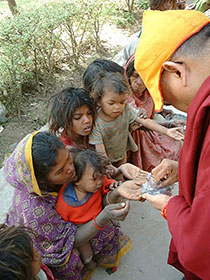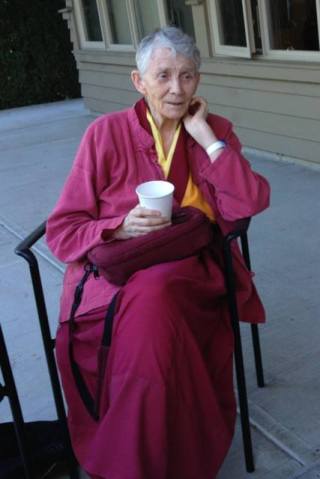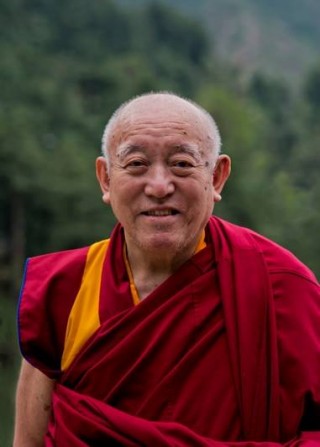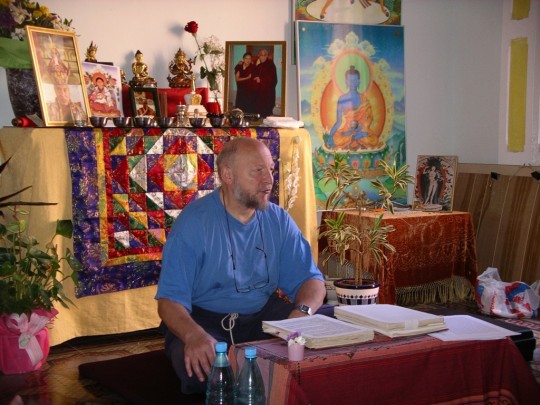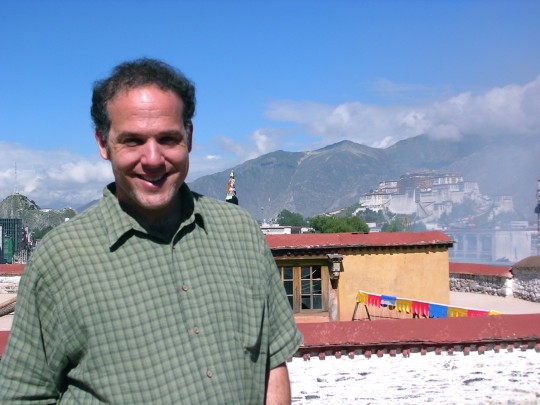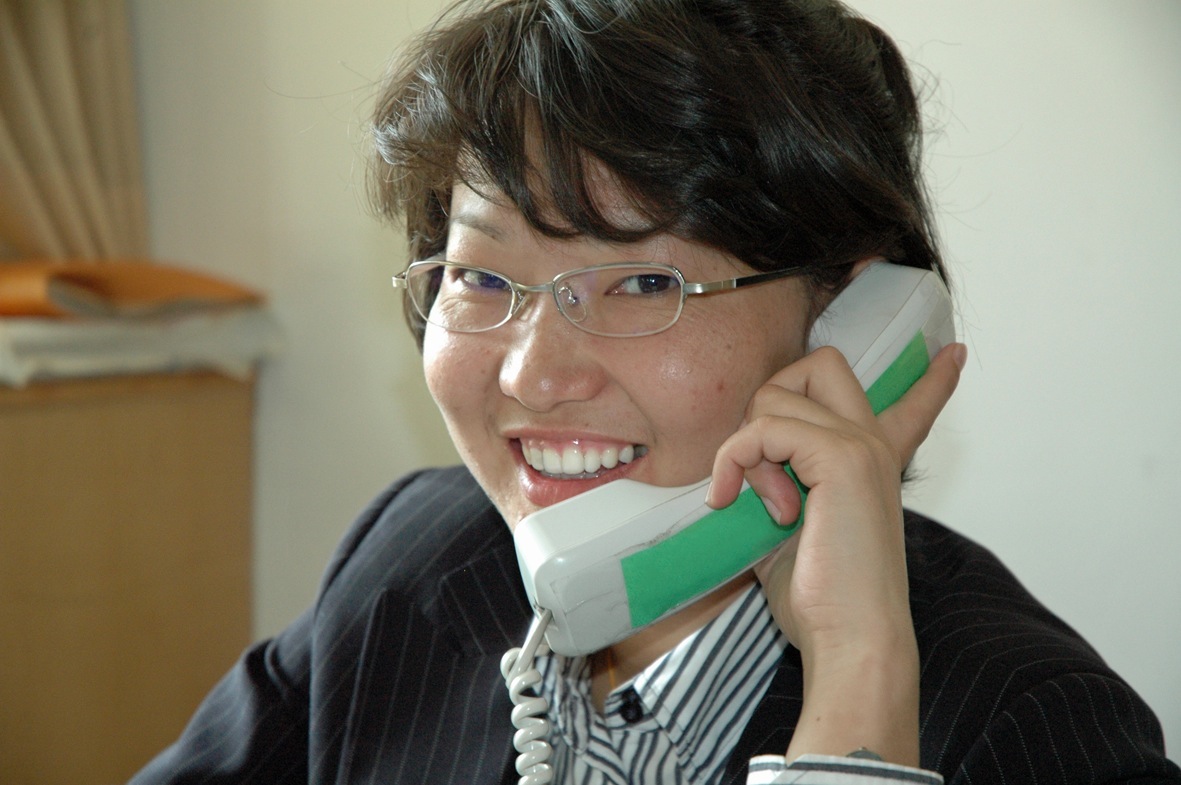- Home
- FPMT Homepage
Foundation for the Preservation of the Mahayana Tradition
The FPMT is an organization devoted to preserving and spreading Mahayana Buddhism worldwide by creating opportunities to listen, reflect, meditate, practice and actualize the unmistaken teachings of the Buddha and based on that experience spreading the Dharma to sentient beings. We provide integrated education through which people’s minds and hearts can be transformed into their highest potential for the benefit of others, inspired by an attitude of universal responsibility and service. We are committed to creating harmonious environments and helping all beings develop their full potential of infinite wisdom and compassion. Our organization is based on the Buddhist tradition of Lama Tsongkhapa of Tibet as taught to us by our founders Lama Thubten Yeshe and Lama Thubten Zopa Rinpoche.
- Willkommen
Die Stiftung zur Erhaltung der Mahayana Tradition (FPMT) ist eine Organisation, die sich weltweit für die Erhaltung und Verbreitung des Mahayana-Buddhismus einsetzt, indem sie Möglichkeiten schafft, den makellosen Lehren des Buddha zuzuhören, über sie zur reflektieren und zu meditieren und auf der Grundlage dieser Erfahrung das Dharma unter den Lebewesen zu verbreiten.
Wir bieten integrierte Schulungswege an, durch denen der Geist und das Herz der Menschen in ihr höchstes Potential verwandelt werden zum Wohl der anderen – inspiriert durch eine Haltung der universellen Verantwortung und dem Wunsch zu dienen. Wir haben uns verpflichtet, harmonische Umgebungen zu schaffen und allen Wesen zu helfen, ihr volles Potenzial unendlicher Weisheit und grenzenlosen Mitgefühls zu verwirklichen.
Unsere Organisation basiert auf der buddhistischen Tradition von Lama Tsongkhapa von Tibet, so wie sie uns von unseren Gründern Lama Thubten Yeshe und Lama Thubten Zopa Rinpoche gelehrt wird.
- Bienvenidos
La Fundación para la preservación de la tradición Mahayana (FPMT) es una organización que se dedica a preservar y difundir el budismo Mahayana en todo el mundo, creando oportunidades para escuchar, reflexionar, meditar, practicar y actualizar las enseñanzas inconfundibles de Buda y en base a esa experiencia difundir el Dharma a los seres.
Proporcionamos una educación integrada a través de la cual las mentes y los corazones de las personas se pueden transformar en su mayor potencial para el beneficio de los demás, inspirados por una actitud de responsabilidad y servicio universales. Estamos comprometidos a crear ambientes armoniosos y ayudar a todos los seres a desarrollar todo su potencial de infinita sabiduría y compasión.
Nuestra organización se basa en la tradición budista de Lama Tsongkhapa del Tíbet como nos lo enseñaron nuestros fundadores Lama Thubten Yeshe y Lama Zopa Rinpoche.
A continuación puede ver una lista de los centros y sus páginas web en su lengua preferida.
- Bienvenue
L’organisation de la FPMT a pour vocation la préservation et la diffusion du bouddhisme du mahayana dans le monde entier. Elle offre l’opportunité d’écouter, de réfléchir, de méditer, de pratiquer et de réaliser les enseignements excellents du Bouddha, pour ensuite transmettre le Dharma à tous les êtres. Nous proposons une formation intégrée grâce à laquelle le cœur et l’esprit de chacun peuvent accomplir leur potentiel le plus élevé pour le bien d’autrui, inspirés par le sens du service et une responsabilité universelle. Nous nous engageons à créer un environnement harmonieux et à aider tous les êtres à épanouir leur potentiel illimité de compassion et de sagesse. Notre organisation s’appuie sur la tradition guéloukpa de Lama Tsongkhapa du Tibet, telle qu’elle a été enseignée par nos fondateurs Lama Thoubtèn Yéshé et Lama Zopa Rinpoché.
Visitez le site de notre Editions Mahayana pour les traductions, conseils et nouvelles du Bureau international en français.
Voici une liste de centres et de leurs sites dans votre langue préférée
- Benvenuto
L’FPMT è un organizzazione il cui scopo è preservare e diffondere il Buddhismo Mahayana nel mondo, creando occasioni di ascolto, riflessione, meditazione e pratica dei perfetti insegnamenti del Buddha, al fine di attualizzare e diffondere il Dharma fra tutti gli esseri senzienti.
Offriamo un’educazione integrata, che può trasformare la mente e i cuori delle persone nel loro massimo potenziale, per il beneficio di tutti gli esseri, ispirati da un’attitudine di responsabilità universale e di servizio.
Il nostro obiettivo è quello di creare contesti armoniosi e aiutare tutti gli esseri a sviluppare in modo completo le proprie potenzialità di infinita saggezza e compassione.
La nostra organizzazione si basa sulla tradizione buddhista di Lama Tsongkhapa del Tibet, così come ci è stata insegnata dai nostri fondatori Lama Thubten Yeshe e Lama Zopa Rinpoche.
Di seguito potete trovare un elenco dei centri e dei loro siti nella lingua da voi prescelta.
- 欢迎 / 歡迎
简体中文
“护持大乘法脉基金会”( 英文简称:FPMT。全名:Foundation for the Preservation of the Mahayana Tradition) 是一个致力于护持和弘扬大乘佛法的国际佛教组织。我们提供听闻,思维,禅修,修行和实证佛陀无误教法的机会,以便让一切众生都能够享受佛法的指引和滋润。
我们全力创造和谐融洽的环境, 为人们提供解行并重的完整佛法教育,以便启发内在的环宇悲心及责任心,并开发内心所蕴藏的巨大潜能 — 无限的智慧与悲心 — 以便利益和服务一切有情。
FPMT的创办人是图腾耶喜喇嘛和喇嘛梭巴仁波切。我们所修习的是由两位上师所教导的,西藏喀巴大师的佛法传承。
繁體中文
護持大乘法脈基金會”( 英文簡稱:FPMT。全名:Found
ation for the Preservation of the Mahayana Tradition ) 是一個致力於護持和弘揚大乘佛法的國際佛教組織。我們提供聽聞, 思維,禪修,修行和實證佛陀無誤教法的機會,以便讓一切眾生都能 夠享受佛法的指引和滋潤。 我們全力創造和諧融洽的環境,
為人們提供解行並重的完整佛法教育,以便啟發內在的環宇悲心及責 任心,並開發內心所蘊藏的巨大潛能 — 無限的智慧與悲心 – – 以便利益和服務一切有情。 FPMT的創辦人是圖騰耶喜喇嘛和喇嘛梭巴仁波切。
我們所修習的是由兩位上師所教導的,西藏喀巴大師的佛法傳承。 察看道场信息:
- FPMT Homepage
- News/Media
-
- Study & Practice
-
-
- About FPMT Education Services
- Latest News
- Programs
- New to Buddhism?
- Buddhist Mind Science: Activating Your Potential
- Heart Advice for Death and Dying
- Discovering Buddhism
- Living in the Path
- Exploring Buddhism
- FPMT Basic Program
- FPMT Masters Program
- FPMT In-Depth Meditation Training
- Maitripa College
- Lotsawa Rinchen Zangpo Translator Program
- Universal Education for Compassion & Wisdom
- Online Learning Center
-
- Prayers & Practice Materials
- Overview of Prayers & Practices
- Full Catalogue of Prayers & Practice Materials
- Explore Popular Topics
- Benefiting Animals
- Chenrezig Resources
- Death & Dying Resources
- Lama Chopa (Guru Puja)
- Lama Zopa Rinpoche: Compendium of Precious Instructions
- Lama Zopa Rinpoche: Life Practice Advice
- Lama Zopa Rinpoche Practice Series
- Lamrim Resources
- Mantras
- Prayer Book Updates
- Purification Practices
- Sutras
- Thought Transformation (Lojong)
- Audio Materials
- Dharma Dates - Tibetan Calendar
- Translation Services
- Publishing Services
- Ways to Offer Support
- Prayers & Practice Materials
-
- Teachings and Advice
- Find Teachings and Advice
- Lama Zopa Rinpoche Advice Page
- Lama Zopa Rinpoche: Compendium of Precious Instructions
- Lama Zopa Rinpoche Video Teachings
- ༧སྐྱབས་རྗེ་བཟོད་པ་རིན་པོ་ཆེ་མཆོག་ནས་སྩལ་བའི་བཀའ་སློབ་བརྙན་འཕྲིན།
- Podcasts
- Lama Yeshe Wisdom Archive
- Buddhism FAQ
- Dharma for Young People
- Resources on Holy Objects
- Teachings and Advice
-
-
*If a menu item has a submenu clicking once will expand the menu clicking twice will open the page.
-
-
- Centers
-
- Teachers
-
- Projects
-
-
-
-
*If a menu item has a submenu clicking once will expand the menu clicking twice will open the page.
-
-
- FPMT
-
-
-
-
-
We should train ourselves not to become engrossed in any of the thoughts continuously arising in our mind. Our consciousness is like a vast ocean with plenty of space for thoughts and emotions to swim about and we should not allow our attention to be distracted by any of them.
Lama Thubten Yeshe
-
-
-
- Shop
-
-
-
The Foundation Store is FPMT’s online shop and features a vast selection of Buddhist study and practice materials written or recommended by our lineage gurus. These items include homestudy programs, prayers and practices in PDF or eBook format, materials for children, and other resources to support practitioners.
Items displayed in the shop are made available for Dharma practice and educational purposes, and never for the purpose of profiting from their sale. Please read FPMT Foundation Store Policy Regarding Dharma Items for more information.
-
-
Obituaries
11
His Eminence Choden Rinpoche Passes Away
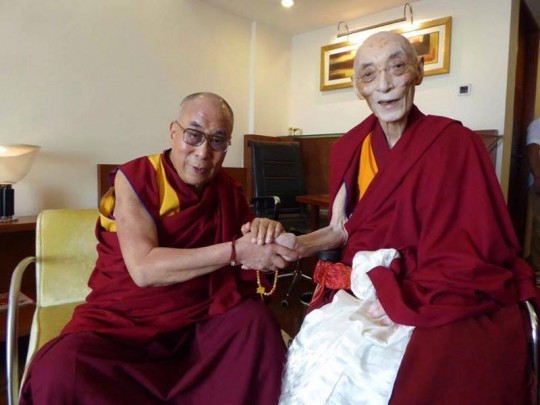
His Holiness the Dalai Lama and His Eminence Choden Rinpoche, New Delhi, India, August 29, 2015. Photo courtesy of Sera Je Monastery.
We are very saddened to share the news that His Eminence Choden Rinpoche passed away on September 11 at 1:30 a.m. India time at Sera Je Monastery in South India. Choden Rinpoche was a highly respected Buddhist master and a much loved teacher, who taught at many FPMT centers over the years.
Choden Rinpoche was born in 1933 in eastern Tibet and was recognized at age three. At age eight he entered Rabten Monastery, and at age fifteen he went to Sera Je Monastery, where he studied the five main texts. Choden Rinpoche became an expert on the teachings on Vinaya – monastic discipline. He was a highly respected scholar and was chosen as one of two Sera Je monks to debate with His Holiness the Dalai Lama during His Holiness’ geshe exams.
During the communist Chinese takeover of Tibet in 1959, Choden Rinpoche stayed in Tibet and went into solitary retreat. He never left his small, dark room in Lhasa from 1965 to 1985, and was virtually unknown in his monastery for this reason. In 1985 he was allowed to leave Tibet for India and has since taught for many years at Sera Je Monastery in South India as well as at Dharma centers throughout the world, including many FPMT centers.
On August 29, 2015, His Holiness the Dalai Lama met with Choden Rinpoche in New Delhi. His Holiness told Choden Rinpoche that he remembered the first time that Choden Rinpoche came to his attention. It was many years ago during an audience with monks at Norbulingka, the summer palace of His Holiness in Tibet. His Holiness said that he remembered seeing how the rays of the sun were falling on Rinpoche’s head and how a bee landed on his head. Choden Rinpoche said he had no memory of that. His Holiness said that at the time he thought that Choden Rinpoche was a magnificent lama. [Photos and translated English text provided by Ven. Tenzin Gache and Ven. Tenzin Namdak of Sera IMI House at Sera Je Monastery. Rebeca Cuan Corral provided a Spanish language translation of the meeting.]
His Holiness also said that since arriving in India, Rinpoche has done his best in many ways such as giving teachings, imparting philosophy lessons to the monks and sharing the Buddhadharma with students throughout the world. His Holiness said that it is important to rejoice in this work.
If you would like a more detailed description of the event of his transition, as well as the collection of prayers that were advised by Choden Rinpoche himself before he showed the aspect of passing away, for all of his students to offer at this time – please click here.
Read updates on the Facebook page set up for this.
See “The Life of a Hidden Meditator: Choden Rinpoche” from Mandala July 2000 to read more about Choden Rinpoche’s experiences in Tibet at Sera Monastery and in Lhasa after 1959. The complete multi-part feature “The Life of a Hidden Meditator” is available as a PDF. You can also read more recent stories about Choden Rinpoche on FPMT.org.
Mandala will have a complete obituary for His Eminence Choden Rinpoche in the January-June 2016 issue.
24
Ven. Margaret McAndrew Passes Away
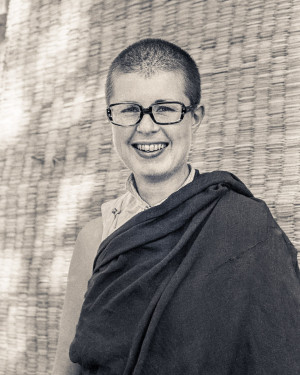
Ven. Margaret McAndrew at Kopan Monastery, Nepal, 1976. Photo courtesy of Lama Yeshe Wisdom Archive.
We are sadden to share the news that Ven. Margaret McAndrew has passed away of cancer In Australia. Affectionately know as Ani Marg, she was a long-time student of Lama Yeshe and Lama Zopa Rinpoche, first arriving at Kopan in Nepal in 1974.
Ven. Margaret ordained in 1976. After spending time in Nepal and India, she returned to Australia in 1978, where she lived at both Tara Institute and Chenrezig Institute for several years (and worked as a cook in both places). She spent six months in the Dorje Phagmo Nunnery in France before finally settling at Chenrezig Institute in the late ‘80s. She was one of the founding members of Chenrezig Nuns’ Community (CNC), which was formally established in 1990. Since then she has been resident there apart from stints as a visiting teacher in Taiwan as well as in Adelaide, Gosford and Sydney in Australia. For several years, she served as the CNC gekyö (disciplinarian). She was diagnosed with bile duct cancer in 2012.
You can read more about her early experiences with the Lama Yeshe and Lama Zopa Rinpoche in “I Realized That My Life Couldn’t Be the Same Again”:
https://fpmt.org/mandala/archives/mandala-for-2013/october/ani-margaret-mcandrew/.
While reading obituaries we can also reflect on our own death and impermanence prompting us to live our lives in the most meaningful way. More advice from Lama Zopa Ripoche on death and dying is available, see Death and Dying: Practices and Resources (fpmt.org/death/).
To read more obituaries from the international FPMT mandala, and to find information on submission guidelines, please visit our new Obituaries page (fpmt.org/media/obituaries/).
- Tagged: obituaries, ven. margaret mcandrew
- 0
24
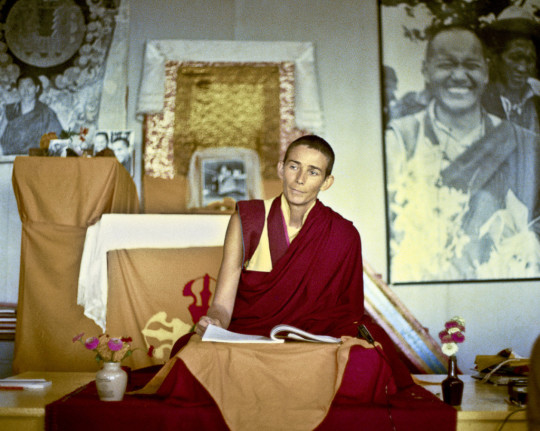
Ven. Ann McNeil teaching at Chenrezig Institute, Eudlo, Queensland, Australia, 1975. Photo courtesy of the Lama Yeshe Wisdom Archive.
Ven. Ann McNeil, one of Lama Yeshe’s and Lama Zopa Rinpoche’s most senior Western students, passed away on Sunday, February 22, 2015, in British Columbia, Canada. Known as Anila Ann, she became a student of Lama Yeshe in 1970, when she met him in Kathmandu, Nepal. She ordained the same year, which you can read about in the post “Ann McNeil and Ordination,” on Lama Yeshe Wisdom Archive’s “Big Love” blog.
Anila Ann was the first director of Chenrezig Institute (CI), the first FPMT center, founded in 1974 in Eudlo, Queensland, Australia. Chenrezig Institute shared on their Facebook page that “it is due to [Anila Ann’s] kindness, and the kindness of Lama Yeshe and Lama Zopa Rinpoche, that we are here today. She lay the foundations for the flourishing, colorful Buddhist center that CI is today. We are incredibly grateful for all she did for us and the Dharma.”
More recently, Anila Ann talked about her work as a Buddhist chaplain with prisoners in a 2011 interview with Mandala. “I loved teaching no matter the classification of the prison,” she said. “As far as teaching goes, it was very unusual to have the same students for less than four or five years. I’ve known most for 10 years and longer.”
“Let your happiness show,” she said in the same interview. “Look people in the eye with a big smile and say ‘Hello, hi, how are you?’ Be ready to assist anybody if they want it.”
Anila Ann was a true FPMT pioneer. (The Lama Yeshe Wisdom Archive has many photos of Anila Ann from the early days of FPMT.) She touched countless lives over her more than 40 years of serving her gurus, helping to spread the authentic Dharma in the West and leading the way for many students to come. She will be deeply missed.
We will run a full obituary for Anila Ann McNeil in our next print issue.
Mandala brings you news of Lama Zopa Rinpoche and of activities, teachings and events from nearly 160 FPMT centers, projects and services around the globe. If you like what you read on Mandala, consider becoming a Friend of FPMT, which supports our work.
- Tagged: anila ann mcneil, chenrezig institute, fpmt history, obituaries
- 0
25
Khensur Denma Locho Rinpoche ceased breathing and entered into clear light meditation on Thursday, October 23, at his home in McLeod Ganj, India, after a brief illness. He was 86 years old.
Denma Locho Rinpoche was a highly respected Tibetan Buddhist master and one of Lama Zopa Rinpoche’s gurus. Denma Locho Rinpoche was also an incredibly powerful and important teacher to many FPMT students and to many monks and nuns at Kopan Monastery. He taught at several FPMT centers and led the Kopan Monlam for many years. He was regarded as an expert on Manjushri’s fierce form, Yamantaka, and on several other teachings and practices.
Denma Locho Rinpoche was born in Kham in eastern Tibet in 1928 and was recognized at the age of six as the reincarnation of a famous yogi, Choying Gyatso, from the local Selkar monastery. At age eleven, he entered Drepung Loseling Monastic College near Lhasa. He obtained his lharampa geshe degree at age 25 and completed his tantric exams at Gyume Tantric College in 1958. He received many teachings from the late Kyabje Ling Rinpoche (the senior tutor to His Holiness the Dalai Lama) and became the main lineage holder of all his teachings.
Denma Locho Rinpoche fled Tibet in 1959 for India, living in Sarnath for two years and then spending two years on a research fellowship at Calcutta University. He then became the principal of the Buddhist School of Dialectics in Ladakh. In 1967, he become abbot of a small monastery in Manali. He served as abbot of His Holiness the Dalai Lama’s Namgyal Monastery from 1986 to 1991 in Dharamsala, and visited the United States on several occasions, including one year teaching at the University of Virginia.
After hearing of Denma Locho Rinpoche’s passing on Thursday, Lama Zopa Rinpoche led a six-hour Lama Chopa and tsog, until 2:30 a.m., at Thubten Shedrup Ling Monastery in Bendigo, Australia, with Sangha and some lay students. Lama Zopa Rinpoche spoke extensively about Denma Locho Rinpoche’s tremendous kindness.
“Denma Locho Rinpoche was always concerned and cared for FPMT,” Lama Zopa Rinpoche said. “He was one of the lamas from Tibet who was extremely learned and famous and good hearted and pure in the vows and this was a big loss for the Gelukpa teachings.”
Denma Locho Rinpoche had great concern for Lama Zopa Rinpoche, FPMT and the Maitreya projects. Many times he was consulted in regards to pujas or practices to overcome obstacles. He also often gave advice on what students could do for Rinpoche’s health and long life. Just before starting the recent month-long retreat in Australia, Ven. Roger Kunsang consulted Denma Locho Rinpoche about pujas that needed to be done to overcome obstacles.
Gelek Rimpoche shared that in early October Denma Locho Rinpoche had “an excellent meeting with His Holiness in Dharamsala. There are pictures showing His Holiness to be extremely happy, touching heads with [Denma] Locho Rinpoche.”
FPMT is deeply saddened by the loss of such a generous and profound teacher as Denma Locho Rinpoche.
- Tagged: khensur denma locho rinpoche, l, obituaries
- 0
16
In September 2014 during the CPMT 2014 meeting, managing editor Laura Miller met with student Françoise Majeste who revealed that a close student of Lama Yeshe and a long-time student of Institut Vajra Yogini in France – Jacques Haesaert – had died over five years ago, but had never been honored in Mandala. We’re happy to now share this tribute to Jacques’ life from his friends and students.
Jacques Haesaert, 67, died in Graulhet, France, July 2009, from a stroke
By Marilyn Magazin and Brigitte Jordan on behalf of the members of the Ambroisie Association
Five years have gone by since our doctor, teacher and friend, Jacques Haesaert, passed on. When he died in July 2009 at the age of 67, we were so unprepared and perturbed that none of his many students in France and Spain thought to send an obituary to Mandala magazine. Jacques was a member of Institut Vajra Yogini in Marzens, France and benefited not only his patients, but also his many students who came to his introductory classes on Tibetan medicine at the institute and his in-depth study programs. Now in remembrance of him, we write this biography as a tribute to him and his work.
Jacques Haesaert was passionate about learning and taught himself to read even before starting school in France. His personal studies of biology, natural medicine, the powers of plants and minerals, archeology, religions, Egyptology, cooking, music, to name a few, surely helped him assimilate Tibetan medicine later on. As well as working in France, Jacques spent many years in Africa and later worked in the Phillipines with local healers.
In 1974, his spiritual search brought him to India where he had his first contact with Tibetan Buddhist philosophy and the medicine practiced in this country. In Nepal he became a disciple of Lama Thubten Yeshe who encouraged him to study Tibetan medicine. Jacques followed Lama’s advice and studied many years in Dharamsala, India with Dr. Ama Lobsang Dolma.
We do not know all the details of his many years of study, treating and accompanying patients in India as a Tibetan doctor, but we do know that he also studied with Dr. Tsering Dinggang and worked for some time with the Missionaries of Charity of Mother Teresa in Calcutta, with the most destitute of people.
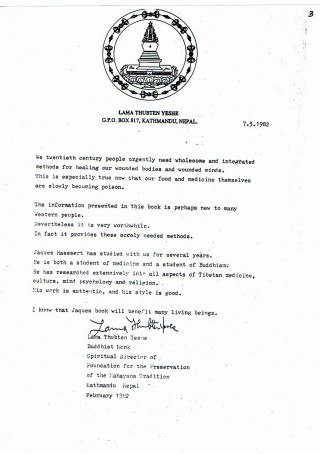
In this 1982 forward, Lama Yeshe praises Jacques’ work writing “Jaques [sic] Haesaert has studied with us for several years … He has researched extensively into all aspects of Tibetan medicine, culture, mind psychology and religion. His work is authentic, and his style is good.”
In 1981, Lama Yeshe asked Jacques to share his knowledge with the Western world in a way that was adapted to the special needs of the people living in those places in actual times. After returning to France, Jacques treated patients and taught for the rest of his life.
As well as a practicing Tibetan Buddhist, he was also a Christian and Bible scholar. Jacques often made parallels between passages in the Bible and teachings of Buddha.
Faithful to the ethics of a Tibetan physician, he expected no pay for his consultations, only accepting offerings. In his later years, he made only two appointments a day so he could remain for hours with each patient in order to treat the patient as a whole and help the person to understand the cause of his ailments, and not just treat his symptoms.
Jacques always intended to write a book so many people could benefit from the knowledge and wisdom he accumulated over so many years, applying Tibetan medicine to the West. He wanted to help Westerners discover the extraordinary and practical knowledge offered by this system. For him it was important to show, through Tibetan medicine, how people can become responsible for their mental and physical health, conscious of their potential for happiness, love and wisdom, and of the errors that would lead them to suffering.
Just months before passing on, after years of our begging for them, he gave to us, his students in France and Spain, his nearly finished book that he used for his classes. He compiled it over decades and organized the information into chapters used for his teaching. Jacques explains important teachings from the medical tantras and elaborates on many aspects of what is health and disease, diagnosis, prevention, and treatment. Moreover, he explains many aspects of Tibetan medicine from a Western point of view.
We, his students and members of the Ambroisie Association, are in the process of translating it from French to English, Spanish, and German. It was his heart-felt wish to help preserve the extensive knowledge and wisdom that is Tibetan medicine from being lost or diluted.
You can find Jacques’ piece “Nature the Great Healer” in the June 2004 issue of Mandala.
Lama Zopa Rinpoche requests that “students who read Mandala pray that the students whose obituaries they read find a perfect human body, meet a Mahayana guru and become enlightened quickly, or be born in a pure land where the teachings exist and they can become enlightened.” While reading obituaries we can also reflect upon our own death and rebirth, prompting us to live our lives in the most meaningful way.
More advice from Lama Zopa Ripoche on death and dying is available on Lama Zopa Rinpoche’s advice page.
- Tagged: france, institut vajra yogini, jacques haesaert, obituaries
- 0
9
Mandala is mourning the loss of our dear friend Dr. James Blumenthal, who passed away very early in the morning of October 8, 2014, at age 47, due to complications from cancer. Jim was a regular contributor to Mandala for many years. He was also a talented and generous scholar, teacher and colleague, serving as a professor of Buddhist philosophy and history at Maitripa College as well as at Oregon State University in the United States. He was a student of Geshe Lhundub Sopa Rinpoche at the University of Wisconsin, where he received his PhD.
Jim was quick to say “yes” whenever we asked him for an article for Mandala and his submissions arrived on time and were beautifully written. He had great depth of knowledge and a sharp mind, yet was always humble and gracious. He had the wonderful ability to make the sometimes complicated and difficult-to-understand world of Buddhist philosophy accessible and fascinating to the not-so-academically inclined. His gentle kindness, clear explanations and always interesting stories will be profoundly missed.
Jim’s death is a great loss for Maitripa College, where he taught since its founding. Jim is survived by his seven-year-old son Ben, wife Tiffany, parents Susan and Jack, brother Tom and Ben’s mother Sara, who was the former editor and publisher of Mandala.
As a small remembrance of Jim, we’ve upload several PDFs of his Mandala articles from archive issue, which you can find here.
Maitripa College has created a webpage for Jim with a collection of prayers that may be recited and dedicated for him. Also on the page, you will find Jim’s translation of Shatarakshita’s Ornament of the Middle Way, a link to a memorial page and a touching video remembrance of Jim by Ven. Thubten Chodron.
Oregon State University has published a moving tribute of Jim.
Mandala will run a full obituary in our next issue.
Mandala brings you news of Lama Zopa Rinpoche and of activities, teachings and events from over 160 FPMT centers, projects and services around the globe. If you like what you read on Mandala, consider becoming a Friend of FPMT, which supports our work.
- Tagged: james blumenthal, maitripa college, obituaries
- 0
10
FPMT News Around the World
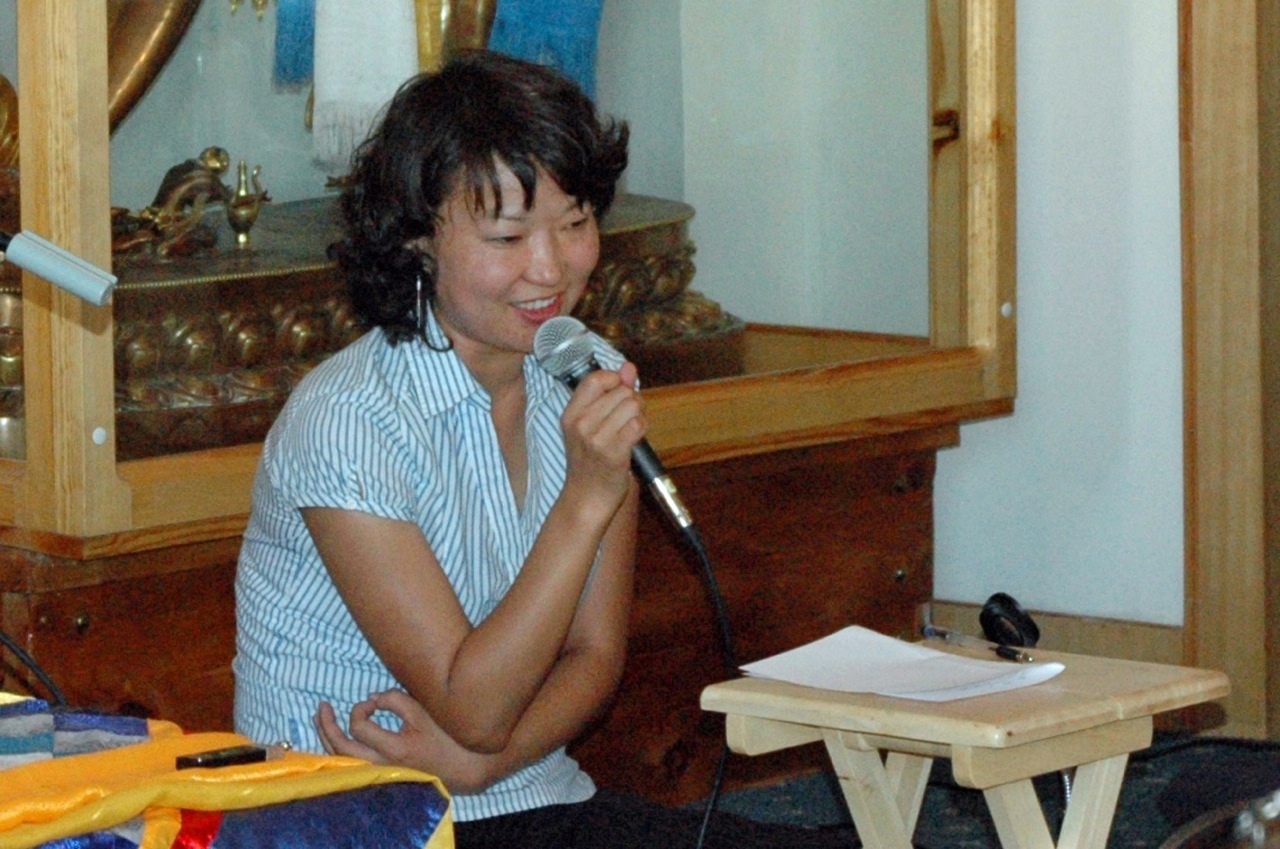
Gunjiimaa translating in Mongolia
It is with sadness that we share the news of Gunjiimaa Ganbat passing away. After struggling with a very difficult to treat form of drug-resistant tuberculosis, Gunjiimaa died in Ulaanbaatar, Mongolia, on April 1, 2012. Gunjiimaa made significant contributions to the development of FPMT Mongolia, including serving as an FPMT Mongolia translator, as Ven. Thubten Gyatso’s (Adrian Feldmann) Mongolian translator and as the previous director of the FPMT center in Ulaanbaatar, Ganden Do Ngag Shedrup Ling, founded in 2000.
“Gunjii,” as she was fondly known, was also the driving force in connecting MK Sen, current CEO of FPMT Mongolia, with several parties able to offer the help and assistance needed for Rinpoche’s priority projects in Mongolia. Gunjii was part of the special team overseeing these projects. Her immense personal contributions to ensure the success of each project will remain as testimony of her faith and devotion to her guru, Lama Zopa Rinpoche. As MK puts it, “Gunjii will be irreplaceable and a great loss to FPMT Mongolia. We pray for her blessed rebirth.”
***
When reading an obituary or an announcement of death in Mandala, Lama Zopa Rinpoche advises that students make prayers for the recently deceased that they “find a perfect human body, meet a Mahayana guru and become enlightened quickly, or be born in a pure land where the teachings exist and they can become enlightened.”
Advice and practices for sickness and death can be found on Lama Zopa Rinpoche’s advice page and at the Foundation Store.
- Tagged: mongolia, obituaries, your community
- 0
- Home
- News/Media
- Study & Practice
- About FPMT Education Services
- Latest News
- Programs
- New to Buddhism?
- Buddhist Mind Science: Activating Your Potential
- Heart Advice for Death and Dying
- Discovering Buddhism
- Living in the Path
- Exploring Buddhism
- FPMT Basic Program
- FPMT Masters Program
- FPMT In-Depth Meditation Training
- Maitripa College
- Lotsawa Rinchen Zangpo Translator Program
- Universal Education for Compassion & Wisdom
- Online Learning Center
- Prayers & Practice Materials
- Overview of Prayers & Practices
- Full Catalogue of Prayers & Practice Materials
- Explore Popular Topics
- Benefiting Animals
- Chenrezig Resources
- Death & Dying Resources
- Lama Chopa (Guru Puja)
- Lama Zopa Rinpoche: Compendium of Precious Instructions
- Lama Zopa Rinpoche: Life Practice Advice
- Lama Zopa Rinpoche Practice Series
- Lamrim Resources
- Mantras
- Prayer Book Updates
- Purification Practices
- Sutras
- Thought Transformation (Lojong)
- Audio Materials
- Dharma Dates – Tibetan Calendar
- Translation Services
- Publishing Services
- Teachings and Advice
- Find Teachings and Advice
- Lama Zopa Rinpoche Advice Page
- Lama Zopa Rinpoche: Compendium of Precious Instructions
- Lama Zopa Rinpoche Video Teachings
- ༧སྐྱབས་རྗེ་བཟོད་པ་རིན་པོ་ཆེ་མཆོག་ནས་སྩལ་བའི་བཀའ་སློབ་བརྙན་འཕྲིན།
- Podcasts
- Lama Yeshe Wisdom Archive
- Buddhism FAQ
- Dharma for Young People
- Resources on Holy Objects
- Ways to Offer Support
- Centers
- Affiliates Area
- Teachers
- Projects
- Charitable Projects
- Make a Donation
- Applying for Grants
- News about Projects
- Other Projects within FPMT
- Support International Office
- Projects Photo Galleries
- Give Where Most Needed
- FPMT
- Shop
Translate*
*powered by Google TranslateTranslation of pages on fpmt.org is performed by Google Translate, a third party service which FPMT has no control over. The service provides automated computer translations that are only an approximation of the websites' original content. The translations should not be considered exact and only used as a rough guide.Hearing the teachings benefits your own mind, and later, because of having heard it, you will be able to benefit others.







